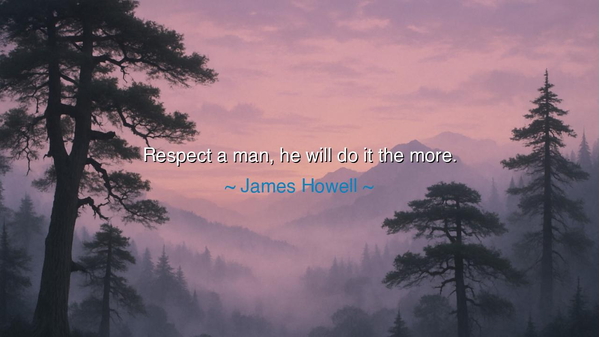
Respect a man, he will do it the more.






The words of James Howell—“Respect a man, he will do it the more.”—are brief, yet they carry the strength of an eternal law of human nature. In them, we find the truth that respect is not only a reward but also a force of inspiration. When a man is honored, when his worth is recognized, he is moved to act with greater diligence, greater courage, and greater devotion. Respect, then, is not merely a reflection of what is already earned—it is a gift that multiplies the very virtues it acknowledges.
The meaning at the heart of Howell’s phrase is that human beings flourish under honor and trust. A man belittled may shrink into hesitation, doubting his own strength. But a man respected rises, for he feels the weight of dignity placed upon him. Respect ennobles; it creates in the heart a desire to prove worthy of the esteem bestowed. Thus, Howell’s wisdom is not only about courtesy, but about leadership, for the leader who respects his people awakens in them the will to surpass themselves.
The ancients knew this power well. Consider the Roman general Germanicus, beloved by his soldiers not only for his skill in battle but for the respect he showed them. He marched with them, listened to their grievances, and honored their courage. In return, they followed him with unwavering loyalty, fighting not only out of duty but out of love. The respect he gave created respect returned, and it magnified the power of his command. Howell’s words echo this truth: to respect a man is to call forth his greatness.
History offers another radiant example in Abraham Lincoln. Known for his humility and deep respect toward even the humblest citizens, he inspired others to do more than they thought possible. His respect for soldiers, his willingness to listen even to critics, and his kindness toward political rivals built a spirit of unity in the midst of division. By respecting others, he multiplied their efforts, stirring in them the will to endure hardship for a cause greater than themselves. Respect became not only his virtue but his power.
The emotional force of Howell’s teaching lies in its simplicity. He does not say that reward, punishment, or fear compels a man to do more—he says it is respect. For respect speaks to the soul, affirming the dignity that every human longs to see reflected in the eyes of another. It calls forth action not through coercion but through love of honor, and it binds men together in bonds far stronger than force.
The lesson for us is profound: give respect freely, and you will awaken strength in others. This means listening sincerely, valuing contributions, speaking with dignity, and treating others not as tools but as souls. It means that in the home, the workplace, or the nation, respect must be the foundation, for without it, no command, no law, no system can endure. With respect, even the weak rise to strength; without it, even the strong falter into bitterness.
Thus, James Howell’s words endure as timeless counsel: to respect a man is to nourish his greatness, to inspire his labor, and to honor the divine spark within him. Let this truth be passed on: that respect is not a gift given only after deeds are done, but the very seed from which noble deeds grow. If we would see others rise, let us respect them first—and in that respect, they will do more, and the world itself will be lifted higher.






AAdministratorAdministrator
Welcome, honored guests. Please leave a comment, we will respond soon